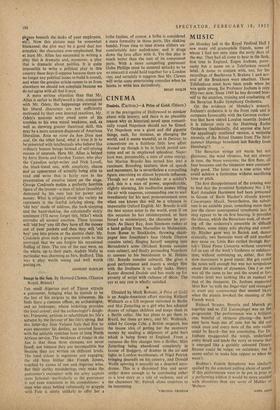MUSIC
ON Monday last in the Royal Festival Hall I saw many old gramophile friends, some of whom I had not seen since the early days of the war. They had all come to hear in the flesh. first time in England, Eugen Jochum, previ- ously but a name on a Telefunken record label. A name to conjure with, too, for his recordings of Beethoven 9, Brahms 1 and sev- eral of the Bruckners were excellent. Those Telefunkens must have been made when he was quite young, for Professor Jochum is only fifty-two now. Since 1949 he has devoted him- self to the creation, training and conducting of the Bavarian Radio Symphony Orchestra.
On the evidence of Monday's concert. Jochum's orchestra is in the front rank and it compares favourably with the German orches- tras that have visited London recently. Indeed it is inferior only to the Hamburg Radio Orchestra (incidentally, did anyone else hear the appallingly mutilated version, a veritable travesty, of the Ritual Dances from The Mid- summer Marriage broadcast last Sunday from Hamburg?).
The Bavarian strings arc warm but not glutinous, the wind virtuoso, but not always in tune, the brass sonorous; the first flute, all four bassoons and the timpanist were outstand- ingly good. The latter was a true artist who could achieve a fortissimo without sacrificing tone or pitch.
The first disappointment of the evening was to find that the promised Symphony No. 2 by Karl Amadeus Hartmann had been jettisoned in favour of Boris Blacher's already known Concertante Musik. Nevertheless, the substi- tute is an amiable piece, something more than just the clever contrapuntal symphonic jazz it may appear to be on first hearing. It provides the chance, which the Bavarians took, of show- ing off the orchestra's ensemble in difficult rhythms, some nippy solo playing and sonor- ity. Blather gave way to Bartok and, demo- cratically, two bassoons went off and another pair came on. Livia Rev rattled throUgh Bar- tok's Third Piano Concerto without renewing for us any of the work's freshness or exhilara- tion; without convincing us, either, that the slow movement is good music. She got round the notes well enough but was not scrupulous about the niceties of dynamics. One f or two was all the same to her and the sound at for- tissimo level was nothing like as musical as that of the timpanist. Dr. Jochum supported Miss Rev 'as with the finger-tips' and managed to avert any contretemps that seemed likely when the pianist invoked the meaning of the French word.










































 Previous page
Previous page